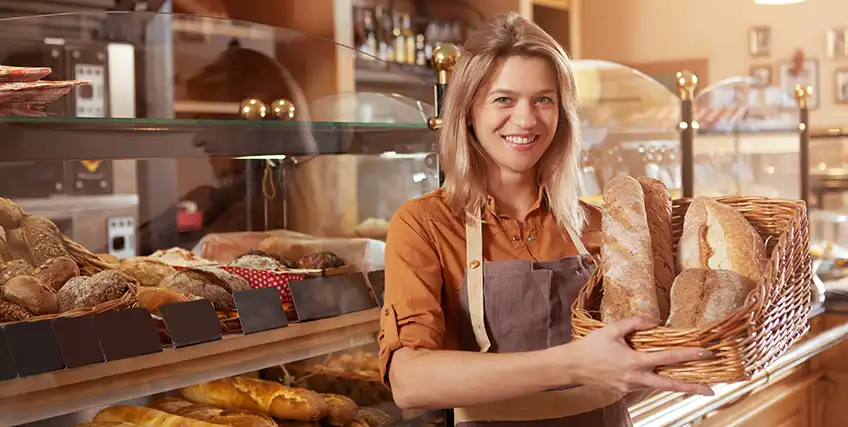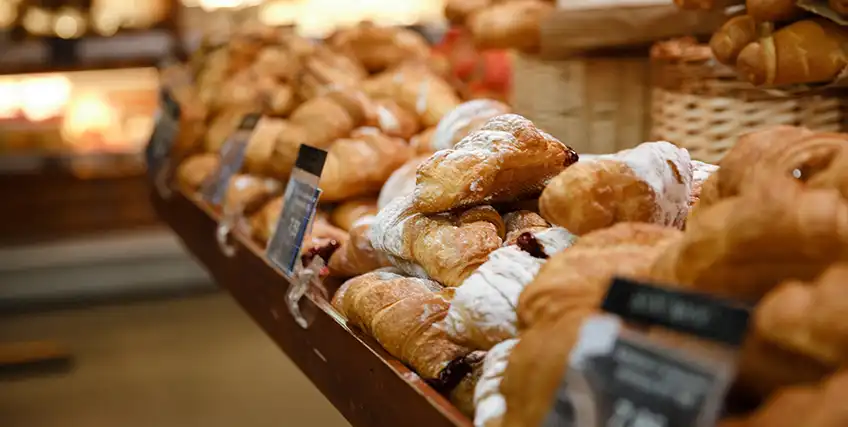How to Start a Cake Business: Essential Guide to Funding and Growth
March 31, 2025 | Last Updated on: April 02, 2025

Starting a cake business can be a rewarding venture. The demand for custom cakes, cupcakes, and specialty baked goods continues to grow. Whether you want to open a storefront or operate from home, planning and preparation are key. This guide will walk you through every step to help you start a cake business successfully.
Understanding the Cake Business Landscape
The bakery industry is thriving, so many entrepreneurs are thinking about how to start a cake business as a home baking business or a full commercial enterprise. Consumers seek high-quality, personalized cakes for birthdays, weddings, and celebrations, which provides numerous opportunities to earn money with cake decorating.
Key trends about cake business include:
- Rise in demand for gluten-free, vegan, and organic cakes
- Popularity of social media-driven cake businesses
- Growth of online ordering and delivery services
Challenges include:
- Competition from established bakeries and home bakers
- Managing production costs and ingredient sourcing
- Navigating local health regulations and licensing
Essential Equipment for Your Bakery
The right equipment ensures efficiency and quality.
Basic baking tools include a commercial oven, heavy-duty mixer, refrigeration unit, and bakeware (pans, trays, cooling racks). To start a cake business, you'll also need decorating essentials like piping bags and tips, fondant tools and molds, and airbrush kits for detailed designs.
To save money when you start a cake business, consider buying used equipment instead of brand new. Buying used can save money as you ramp up revenues. However, new items often come with warranties and typically are more reliable. Compare costs and quality before purchasing.
Choosing the Right Location
Location affects visibility and accessibility.
Factors to consider:
- Foot traffic and local demographics
- Nearby competition
- Cost of rent and utilities
Options include:
- Storefront: Ideal for high visibility but comes with higher costs for rent, liability insurance, and utilities.
- Home bakery business: Lower overhead using your home kitchen. Even home-based businesses must follow be in compliance with cottage food laws.
- Commercial kitchen rental: Shared space with professional-grade equipment on a regular basis or as a pop-up kitchen coinciding with seasonal holidays and events.
- Lease vs. buy: Leasing provides flexibility while buying offers long-term investment potential.
Exploring Bakery Business Loan Options to Start a Cake Business
Securing funding helps cover startup and operational costs.
SBA Loans
SBA loans are backed by the government and provide lower interest rates compared to traditional loans. A small business loan for a bakery is ideal for small business owners who need affordable financing with longer repayment terms. The application process can be rigorous, requiring strong financial documentation and a well-prepared business plan. If approved, you can use the funds for equipment, supplies, or working capital.
Traditional Bank Loans
Banks offer larger loan amounts for businesses with strong credit histories. These conventional loans typically require collateral, such as business assets or personal property, to secure funding. While bank loans provide financial stability, the approval process can be strict. If you have good credit and a solid repayment plan, a bank loan can offer a reliable source of capital to start a cake business.
Personal Loans
Personal loans are an option if you have a good credit score and need quick access to funds. These loans are unsecured, meaning you don’t need to put up collateral. While personal loans often have higher interest rates than business loans, they can be a viable option if traditional business financing isn’t available. Be sure to review repayment terms and ensure you can manage the monthly payments.
Business Credit Cards
Business credit cards offer flexible funding for everyday expenses. Many cards come with rewards programs, cashback offers, and expense-tracking features that can benefit small business owners. While credit cards provide instant purchasing power, they also carry high-interest rates if balances aren’t paid off each month. Using a business credit card responsibly can help build your business credit score over time.
Home Equity Loans
If you own a home, a home equity loan or line of credit (HELOC) can provide funding by leveraging the equity in your property. These loans often have lower interest rates than traditional business loans, making them an attractive option for securing capital. However, your home serves as collateral, meaning you risk losing it if you’re unable to make payments. This option is best for those confident in their ability to repay the loan.
Microloans
Microloans are small loans designed for startups and entrepreneurs who may not qualify for traditional loans. These loans, often provided by nonprofit organizations and community lenders, have more flexible credit requirements. Microloans are a great option if you need a small amount of capital to purchase ingredients, marketing materials, or minor equipment upgrades.
Grants and Funding Programs
Some government and private organizations offer grants to help small food businesses grow. Unlike loans, grants do not need to be repaid. However, competition for grants can be high, and eligibility requirements vary. Research industry-specific grants that support bakery businesses, and prepare a compelling application to increase your chances of receiving funding.
Crowdfunding
Crowdfunding allows you to raise money through online platforms like Kickstarter or GoFundMe. This method works well if you can generate interest from your community or social media audience. By offering incentives, such as discounts or free products, you can encourage people to help you start a cake business financially. Crowdfunding is a creative way to secure funding without taking on debt.
Tips for Choosing the Right Lender
Selecting the right lender impacts your financial stability. When getting a loan to start a cake business, ask questions about the loan that may affect your finances for several years until the loan is repaid.
- Interest rates: Variable interest rates often start out lower than fixed-rate loans, but your payments could become unaffordable if rates rise.
- Repayment terms: How long will you need to make payments? Are the payments interest-only with a balloon payment at the end, or are they on an amortizing schedule that spreads the balance reduction over time? Can you pay off the loan early without incurring additional fees.
- Loan approval time and requirements: How long will it take to make a decision and what paperwork is needed when applying?
- Personal guarantees: Are you personally liable for the debt in case the business cannot make the payments?
- Collateral: Will you need to secure the loan with specific business or personal assets? Does the lender require a broad UCC-1 filing that covers all business assets?
- Customer service and lender reputation: How does the lender treat its customers before, during, and after loan repayment?
Prepare necessary documents, such as business financials, credit reports, and a detailed business plan.
Improving Your Credit Before Applying for a Loan
Strong credit increases loan approval chances and may qualify you for better interest rates and terms. While some credit behaviors take time to reflect in your credit score, others have a more immediate effect.
Steps to improve credit:
- Check your credit score and fix errors: Almost half of consumers in a study by Consumer Reports found errors on their credit reports. These mistakes could negatively impact credit scores and correcting them could boost your credit score.
- Pay down outstanding debts: Outstanding balances on revolving debt (credit cards and lines of credit) are 30% of your credit score. Reducing your utilization ratio provides an immediate benefit to your score.
- Build a track record of timely payments: Making on-time payments is the single biggest factor in your credit score. Even if you cannot pay off the entire balance, make the minimum payment due to avoid late charges and negative marks on your credit.
- Minimize credit applications: Too many credit inquiries within a short period of time can hurt your credit score. Additionally, lenders may view this as a sign of financial distress and may decline your application due to potential risk.
- Become an authorized user: If you don't have established credit or your experience is limited, ask a family member or trusted friend to become an authorized user on their credit card. You'll piggyback on that account's positive credit history to build your score.
Marketing Your Cake Business
Effective marketing attracts and retains customers. Mouth-watering photos, engaging videos, and customer reviews are wildly popular in attracting potential customers.
Key strategies:
- Brand identity: Create a logo, business name, and theme that separates your business from the competition. Print business cards to hand out to potential customers, at industry events, and during networking opportunities.
- Social media marketing: Post photos, reels, and promotions and encourage customers to do the same. Encourage customers to post pictures using your hashtag with regular promotions and contests.
- Local advertising: Flyers, partnerships with event planners, and word-of-mouth referrals. While many businesses focus on online content, traditional media is still very effective.
- Customer reviews: Encourage satisfied customers to leave feedback online through Yelp, Facebook page and groups, Google, TripAdvisor, and others. Customers buying wedding cakes may also leave reviews on The Knot and other niche sites.
Tips to Start a Cake Business Successfully
Smooth operations lead to long-term success. To start a cake business and have it be successful, you'll need to effectively balance the needs of customers, staff, vendors, and more.
Key areas to manage:
- Hiring staff: Train employees for baking, decorating, and customer service. Consider hiring staff on a contract basis to assist with orders when you first start a cake business. As your business grows, you can convert them into part-time or full-time employees.
- Inventory management: Track ingredient usage and minimize waste. This helps to reduce excess inventory and keeps your costs down as you order only what will be used to meet customer orders.
- Supplier relationships: Find reliable sources for quality ingredients. As you build up a solid reputation, vendors may offer terms on orders. This minimizes how much you need to borrow from lenders, which will reduce your interest charges.
- Customer satisfaction: Offer consistent quality and personalized service. Happy customers mean return business, referrals, and positive reviews on social media. Embrace online campaigns and hashtags that can turn their content into viral posts.
- Local laws and license requirements: Be sure to follow local and state laws from the health department for food safety. This will keep you in compliance and avoid negative experiences with customers.
The Bottom Line About How to Start a Cake Business
Starting a cake business requires planning, financial management, and effective marketing. With dedication and the right strategy, you can build a profitable and fulfilling venture. Take the first step today and turn your passion for baking into a thriving business.
Frequently Asked Questions (FAQs)
Is Cake a Profitable Business?
You can make significant profits as a pastry chef who makes cakes. Baking cakes generally requires low overhead and does not require a traditional storefront or full-time employees.
How Much Does It Take to Start a Cake Business?
The average cost to start a cake business is $10,000 to $50,000, depending on the equipment you buy, your location, and how you market your business. This cost is generally lower than opening a restaurant, which requires a retail location, employees, inventory, and other costs.
Can You Make Cake at Home and Sell?
Yes, many entrepreneurs start a cake business at home before expanding into a permanent location. Using your home kitchen, you can make cakes for customer events and deliver the finished product to their location. Keeping costs low ensures you'll reach profitability more quickly.
What is the Most Profitable Bakery Item?
Pastry chefs can turn to a number of profitable bakery items to boost their profits. The most profitable items include custom cakes, artisan bread, cupcakes, croissants, and cookies. These baked goods typically have cost-effective ingredients and command a higher price due to quality, presentation, and unique designs.
How to Start a Cake Business With No Money?
If you want to start a cake business but don't have enough money, consider applying for a loan. Many lenders will give you a loan if you have good credit and regular income, even if you don't have a lot of experience. Consider working with an online lender if traditional banks won't approve your application.




